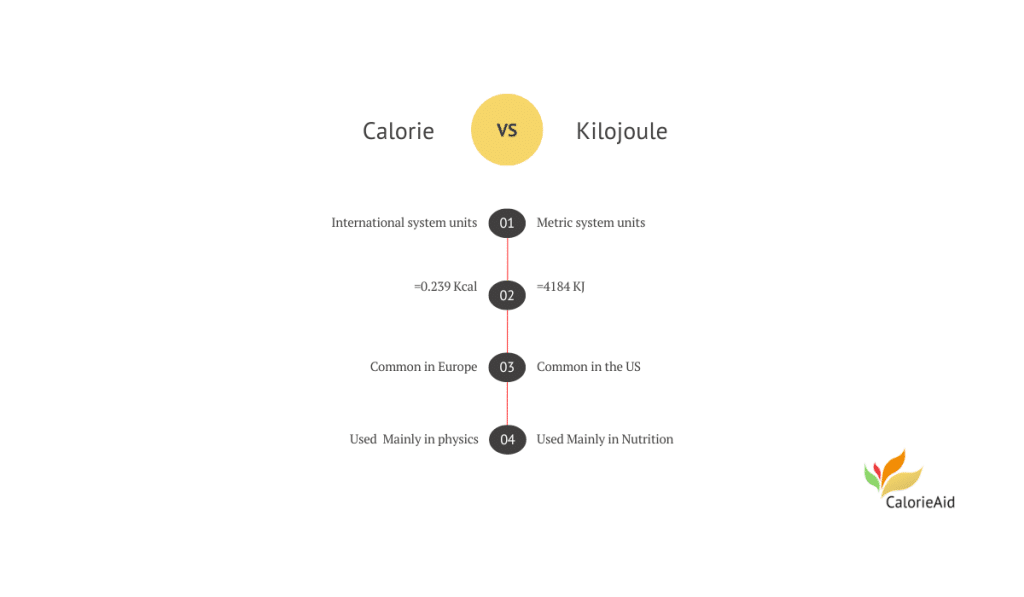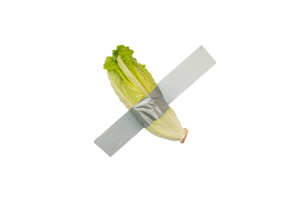Differentiating between a Calorie and KJ can get confusing sometimes, and that info might be essential to your health. In this article, I will guide you step by step into telling the difference. I will also answer some basic questions that might be on your mind so let’s dive right in.
Table of Contents
Calorie KJ comparison
Calorie and KJ are both units of measurement used for the energy found in food. The Kilojoules are the units used in the international system whereas Kilocalories or (Calories for short) are used in the metric system. The abbreviation for Calories is Kcal while the KJ is used for Kilojoules.

When counting calories is it calories or KJ
Kcal is the abbreviation for the Calorie, whereas KJ is for kilojoules. It is worth noting that Calories (with a capital C) is used to refer to kilocalories, that’s why the abbreviation is Kcal. On the other hand, calories with a small c refers to individual calories. Each kilocalorie=1000 calories. Kilocalories are called Calories with a capital C for short.
Calorie KJ Converter (How many calories are in KJ)
Every 1 Calorie is 4.184 KJ. You can use the calculator we provided to change between the 2 units of measurement.
Should I use KJ or Calorie
You can use either, but people use the kcal units more frequently. Most food labels list both, but when calculating your body’s nutritional needs it is easier to use kcals
Where are calories found?
Calories are the name given to the energy that comes out of food when metabolized. The body stores this energy as glucose (sugar) or fat. Most foods sold these days have labels that show how many calories they contain and their nutritional breakdown.
How many calories does my body need?
Your total Daily energy expenditure (TDEE) depends on age, height, and physical activity level. Your body might also re-adjust its basal metabolic rate depending on your activity level and diet (more on that later). To understand fully how to guestimate your TDEE you can check my article about healthy and unhealthy foods.
Can calorie counting help you lose weight?
Calorie counting can help you lose weight by introducing a calorie gap into your diet (i.e. when you eat fewer calories than your body needs). The extra calories your body needs will come from your body fat. However, it is not a very straightforward approach, your body might decrease its caloric needs if it senses dietary restrictions as a defense mechanism due to lack of food.
Why calorie counting is bad
Calorie counting can be a gruesome task when performed daily at every meal. It can also cause you to obsess over calories and sometimes mislead you into making a wrong decision. Also, calories are not created equal. You should include high protein or fiber and not just reduce your caloric intake.
Why calorie counting works
By knowing your average basal metabolic rate and total daily energy expenditure (i.e. how many calories you need daily), you can create a caloric gap that will cause your body to burn your fat to get the deficient calories. You will lose weight if you maintain that gap as the caloric deficit accumulates.
When calorie restriction doesn't work
Calorie restriction won’t work if you do it for a long period. Your body adjusts your metabolic rate to the new caloric intake and you stop losing weight. There are several things you can do to overcome this:
- Caloric Cycling: Have a cheat meal or a cheat day once in a while, this will convince your body that it is not in lack of food situation, and won’t lower your daily caloric expenditure. Dieting is a fine balance between restricting calories most of the time and letting loose occasionally.
- Strength exercises: will put your body in an anabolic state and burn fat to build muscles. This won’t make the body think it is in a food-lacking situation.
- Intermittent fasting: fasting for an extended period might lower your blood insulin level, and this burns fat.
Why calorie calculators are wrong
What Calorie or KJ calculators don’t consider is your body’s regulatory mechanisms. Most of these mechanisms are hormonal and serve to condition your body accordingly. For example, if you keep eating less than you need for a long period, your body’s regulatory mechanisms will lower your basic metabolic rate so you don’t starve. This will manifest as low energy levels (feeling lazy) and low body thermogenesis (feeling cold). Calculators only give an estimate of your daily caloric needs, and don’t take into consideration your overall nutritional condition.
Can calorie deficit cause constipation
Calorie deficit doesn’t cause constipation. But as you cut calories, you might eat less dietary fiber, which can cause constipation. That makes you think your diet is causing your digestive troubles. To solve this, ensure that for every 500 calories you consume, you get around 7 grams of fiber. This should solve your constipation problem. If the problem persists, see a doctor to exclude any digestive disorders.
Can calorie deficit cause joint pain?
There’s no direct scientific link between joint pain and calorie deficit. However, joint pain might co-exist with calorie deficit for many reasons including:
- Severe workouts: if you want to lose weight, you’re probably working out and not just dieting. You should examine your workouts and daily activities if you’re experiencing pain in a specific joint or many joints.
- Nutrient deficiencies: According to the arthritis foundation, the lack of fish oil in the diet might cause stiff joints. Other essential nutrients to your joints might be absent in a severe calorie deficit.
- Your Body weight: might cause pain in weight-bearing joints like your knee. The calorie deficit is not the culprit here, but it might coincide. The solution is to strengthen your muscles with exercise.
Should I do calorie deficit or keto?
There are conflicting opinions surrounding this subject, but do what you prefer. The factors that affect your decision include your health status and lifestyle. I choose calorie restriction for the following reasons:
- No keto fever. It affects my daily activity level and it isn’t very good to deal with.
- You can easily incorporate Calorie restriction into your lifestyle. It is flexible and covers a wider spectrum of foods.
- The Keto diet can cause multiple health issues like kidney stones, nutrient deficiencies, constipation, and increased risk of heart disease.
- A Keto diet can result in social isolation and disordered eating due to its restrictive nature.
Also, Keto is not safe for those with pre-existing medical conditions involving the liver, pancreas, gallbladder, or thyroid. Be sure to check with your doctor before starting it.
I hope I answered all of your questions about the calorie KJ relationship, you can drop a comment if you need more clarification. Feel free to share this article with someone who needs to know about these energy measurement units.


